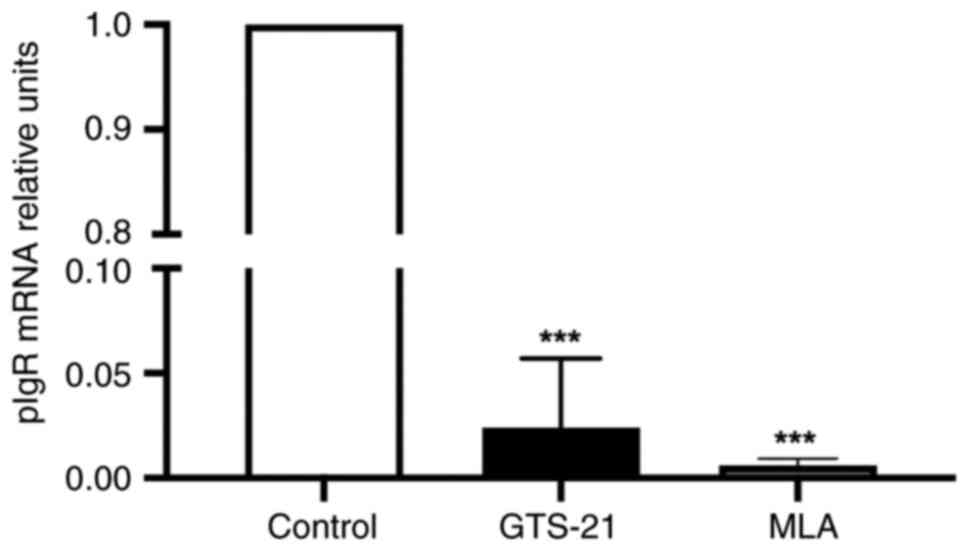|
1
|
Beckmann J and Lips KS: The non-neuronal
cholinergic system in health and disease. Pharmacology. 92:286–302.
2013.PubMed/NCBI View Article : Google Scholar
|
|
2
|
Halder N and Lal G: Cholinergic system and
its therapeutic importance in inflammation and autoimmunity. Front
Immunol. 12(660342)2021.PubMed/NCBI View Article : Google Scholar
|
|
3
|
Felder C: Acetylcholine multiple
receptors: Signal transduction through multiple effectors. Faseb J.
9:619–625. 1995.PubMed/NCBI
|
|
4
|
Goverse G, Stakenborg M and Matteoli G:
The intestinal cholinergic anti-inflammatory pathway. J Physiol.
594:5771–5780. 2016.PubMed/NCBI View
Article : Google Scholar
|
|
5
|
Li Y, Jin L and Chen T: The effects of
secretory IgA in the mucosal immune system. Biomed Res Int.
2020(2032057)2020.PubMed/NCBI View Article : Google Scholar
|
|
6
|
Wells JM, Brummer RJ, Derrien M, MacDonald
TT, Troost F, Cani PD, Theodorou V, Dekker J, Méheust A, de Vos WM,
et al: Homeostasis of the gut barrier and potential biomarkers. Am
J Physiol Gastrointest Liver Physiol. 312:G171–G193.
2017.PubMed/NCBI View Article : Google Scholar
|
|
7
|
Schmidt LD, Xie Y, Lyte M, Vulchanova L
and Brown DR: Autonomic neurotransmitters modulate immunoglobulin A
secretion in porcine colonic mucosa. J Neuroimmunol. 185:20–28.
2007.PubMed/NCBI View Article : Google Scholar
|
|
8
|
Wilson ID, Soltis RD, Olson RE and
Erlandsen SL: Cholinergic stimulation of immunoglobulin A secretion
in rat intestine. Gastroenterology. 83:881–888. 1982.PubMed/NCBI
|
|
9
|
McLoughlin GA, Bradley J, Chapman DM,
Temple JG, Hede JE and McFarland J: IgA deficiency and severe
post-vagotomy diarrhoea. Lancet. 24:168–170. 1976.PubMed/NCBI View Article : Google Scholar
|
|
10
|
McLoughlin GA, Hede JE, Temple JG, Bradley
J, Chapman DM and McFarland J: The role of IgA in the prevention of
bacterial colonization of the jejunum in the vagotomized subject.
Br J Surg. 6:435–437. 1978.PubMed/NCBI View Article : Google Scholar
|
|
11
|
Arciniega-Martínez IM, Drago-Serrano ME,
Salas-Pimentel M, Ventura-Juárez J, Reséndiz-Albor AA and
Campos-Rodríguez R: Anterior subdiaphragmatic vagotomy decreases
the IgA antibody response in the small intestines of BALB/c mice. J
Neuroimmunol. 337(577072)2019.PubMed/NCBI View Article : Google Scholar
|
|
12
|
Pérez-López JA, Rojas-Hernández S,
Campos-Rodríguez R, Arciniega-Martínez IM, Cruz-Hernández TR,
Reséndiz-Albor AA and Drago-Serrano ME: Posterior subdiaphragmatic
vagotomy downmodulates the IgA levels in the small intestine of
BALB/c mice. Neuroimmunomodulation. 26:292–300. 2019.PubMed/NCBI View Article : Google Scholar
|
|
13
|
Gottwald T, Lhoták Š and Stead RH: Effect
of truncal vagotomy and capsaicin on mast cells and IgA-positive
plasma cells in rat jejunal mucosa. Neurogastroenterol Motil.
9:25–32. 1997.PubMed/NCBI View Article : Google Scholar
|
|
14
|
Kilkenny C, Browne WJ, Cuthill IC, Emerson
M and Altman DG: Improving bioscience research reporting: The
ARRIVE guidelines for reporting animal research. Osteoarthr Cartil.
20:256–260. 2012.PubMed/NCBI View Article : Google Scholar
|
|
15
|
Sitapara RA, Gauthier AG, Valdés-Ferrer
SI, Lin M, Patel V, Wang M, Martino AT, Perron JC, Ashby CR Jr,
Tracey KJ, et al: The α7 nicotinic acetylcholine receptor agonist,
GTS-21, attenuates hyperoxia-induced acute inflammatory lung injury
by alleviating the accumulation of HMGB1 in the airways and the
circulation. Mol Med. 26(63)2020.PubMed/NCBI View Article : Google Scholar
|
|
16
|
Mina-Osorio P, Rosas-Ballina M,
Valdes-Ferrer SI, Al-Abed Y, Tracey KJ and Diamond B: Neural
signaling in the spleen controls B-cell responses to blood-borne
antigen. Mol Med. 18:618–627. 2012.PubMed/NCBI View Article : Google Scholar
|
|
17
|
Reséndiz-Albor AA, Esquivel R,
López-Revilla R, Verdín L and Moreno-Fierros L: Striking phenotypic
and functional differences in lamina propria lymphocytes from the
large and small intestine of mice. Life Sci. 76:2783–2803.
2005.PubMed/NCBI View Article : Google Scholar
|
|
18
|
Reséndiz-Albor AA, Reina-Garfias H,
Rojas-Hernández S, Jarillo-Luna A, Rivera-Aguilar V, Miliar-García
A and Campos-Rodríguez R: Regionalization of pIgR expression in the
mucosa of mouse small intestine. Immunol Lett. 128:59–67.
2010.PubMed/NCBI View Article : Google Scholar
|
|
19
|
Livak KJ and Schmittgen TD: Analysis of
relative gene expression data using real-time quantitative PCR and
the 2(-Delta Delta C(T)) method. Methods. 25:402–408.
2001.PubMed/NCBI View Article : Google Scholar
|
|
20
|
Cerutti A: The regulation of IgA class
switching. Nat Rev Immunol. 8:421–434. 2008.PubMed/NCBI View
Article : Google Scholar
|
|
21
|
Wei H and Wang JY: Role of polymeric
immunoglobulin receptor in IgA and IgM transcytosis. Int J Mol Sci.
22:1–20. 2021.PubMed/NCBI View Article : Google Scholar
|
|
22
|
Schmidt PT, Eriksen L, Loftager M,
Rasmussen TN and Holst JJ: Fast acting nervous regulation of
immunoglobulin A secretion from isolated perfused porcine ileum.
Gut. 45:679–685. 1999.PubMed/NCBI View Article : Google Scholar
|
|
23
|
Freier S, Eran M and Faber J: Effect of
cholecystokinin and of its antagonist, of atropine, and of food on
the release of immunoglobulin A and immunoglobulin G specific
antibodies in the rat intestine. Gastroenterology. 93:1242–1246.
1987.PubMed/NCBI View Article : Google Scholar
|
|
24
|
Johansen FE and Kaetzel CS: Regulation of
the polymeric immunoglobulin receptor and IgA transport: New
advances in environmental factors that stimulate pIgR expression
and its role in mucosal immunity. Mucosal Immunol. 4:598–602.
2011.PubMed/NCBI View Article : Google Scholar
|
|
25
|
de Jonge WJ and Ulloa L: The alpha7
nicotinic acetylcholine receptor as a pharmacological target for
inflammation. Br J Pharmacol. 151:915–929. 2007.PubMed/NCBI View Article : Google Scholar
|
|
26
|
Lambrichts DPV, Boersema GSA, Tas B, Wu Z,
Vrijland WW, Kleinrensink GJ, Jeekel J, Lange JF and Menon AG:
Nicotine chewing gum for the prevention of postoperative ileus
after colorectal surgery: A multicenter, double-blind, randomised,
controlled pilot study: Int J Colorectal. Dis. 32:1267–1275.
2017.PubMed/NCBI View Article : Google Scholar
|


















